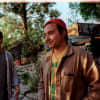The best thing about Pitchfork's Veckatimest review is that the reviewer doesn't seem to realize how deeply he's been affected by Grizzly Bear. He goes on for over 1,000 words without really saying much to persuade anyone to buy the album, but says it in geographically and historically bewildering blend of English idioms and dialect—a couple Lord know's, some ain'ts, a Shakespearean plea for shopping and a few dudeses. If you don't actually care about his opinion, it's a pretty good conceptual rendering of the album itself, which taken as a whole, could be the greatest work of Hillbilliamsburg musical theater we will ever hear. This is why we chose to put Grizzly Bear in our current David Byrne icon issue, because they are not afraid to go all out in search of beauty, in the same way Byrne did and still does. Read the feature story after the jump, and make sure to pick up Veckatimest today at your favorite music shop.
Booking hotel rooms for Grizzly Bear is Chris Bear’s responsibility, which is weird, because he’s their drummer. “You get a little pleasure out of Priceline-ing?” the group’s singer Ed Droste asks him teasingly, and Bear says yes. It seems bizarre that a band as busy and beloved as Grizzly Bear would spend time looking for their own great deals. But maybe they don’t know that yet.
When Grizzly Bear played New York in early August of last year, everyone there sang along enrapt, glowing an underwater green from the house lights. It was an off day from the band’s slot opening for Radiohead and they’d returned to Brooklyn to play one for the hometown fans. I was there and remember thinking that there was no reason this band could and should not be Radiohead, with their simultaneously complex and melodically simple songs. Droste pish-poshes this idea of ascent as “sacrilegious,” but he’s either modest or doesn’t know what he’s talking about.
Since that show, Grizzly Bear finished writing and recording their lovely third album Veckatimest. Compared to the occasionally gaudy experimentation of Yellow House, their previous album, Veckatimist—named for a little island off the coast of Cape Cod near where some of the album was recorded—is crystalline. It’s a luxurious record—its songs’ clean, loud pop structures softened by guitarist and singer Daniel Rossen and Droste’s joyous moans. Rossen reflexively calls the record “weird,” an easy return to the youthful crutch of calm counterculture that leaves Grizzly Bear at a slippery point in their trajectory. Pressed, he retreats from “weird” to “moody” and refers to the rowdy structural changes of the album’s opener “Southern Point.” The song does indeed wobble through speeds and tones in its five minutes, but it is fully complicated and evolved, not lumbering and unwieldy. A later song on Veckatimest, “Ready Able,” starts with an angry chug that is quickly accentuated with tiny guitar and then a lot of what could probably be described as lolling. It’s immensely pleasant, slightly melancholy and just plainly good. Rossen might think the spooky, free-floating vocals layered over the song are weird, but they’re just details, accoutrements. It’s like thinking a Turkish rug makes your living room weird because the rest of your furniture is off-white. Veckatimest is what happens when an inclination to weirdness evaporates under years of practice and skill. Grizzly Bear’s mindset about their music may not have changed but the music went ahead and changed without them.
No one in Grizzly Bear, including bassist/tinkerer Chris Taylor, is over 30, and Veckatimest is wholly the result of early adulthood cohesion. If the album were a career path it would be the promotion you get a few years out of college (which they are). So is Veckatimest a steppingstone or a dream job? How can they know? “Everyone around you is going to be telling you that everything is going to be amazing. You just have to get that out of your mind,” Rossen says. “I feel really blessed that I get to do something that so few people get to do. I get to make my own music for a living.” But he is clearly flustered by all the attention and the subsequent ambient pressure surrounding the album. “We’re going to be Zen because we’ve got a lot ahead of us.” Then he makes a serene triangle with his arms.
Taylor has been more exact with his reaction to the pressure. He spent the two years between Yellow House and Veckatimest producing albums for bands like Dirty Projectors and Rossen’s longtime side project Department of Eagles, and his ear for other people’s bliss has seeped into Grizzly Bear’s music. “There are things musically that I do and I do it because I want to do it,” he says. “And then there are other things that I’m thinking sound really beautiful to me and I can imagine someone else listening to it and maybe being taken to some nice place.” Droste is more blunt. “I was like, Are we going to write something great or not? That’s what I was worried about.” Veckatimest blossomed from all that self-awareness and its coupled anxiety. It’s an album full of buzzworthy bullet points—Recorded in a church! Recorded by the beach! Featuring a teenage girls’ choir!—but it’s less the indulgence of throwing everything at the wall and more of collecting everything carefully, gluing it and making sure it sticks in the proper places. “A lot of classic albums that people swear by, I don’t get,” says Droste. “All I know is I’m really proud of Veckatimest.”
Just after we meet, while walking down the street, Rossen is stopped by a goateed Brooklynite. “You’re from Grizzly Bear, right?” he asks. Rossen says yes and the man thanks him for his music, politely but swiftly, as if trying to stay cool. Rossen blushes. We are walking because we’d been forced to switch the location of our interview as the restaurant where we’d originally intended to sit down was surreptitiously closed for a photo shoot of movie star Amy Adams. She arrived in an Escalade pulled up to the front of the restaurant and came out, fully done up and radiantly famous. But no one on the street said anything to her.


